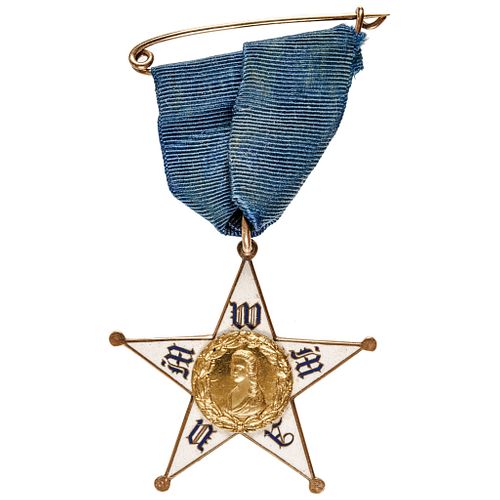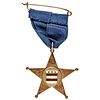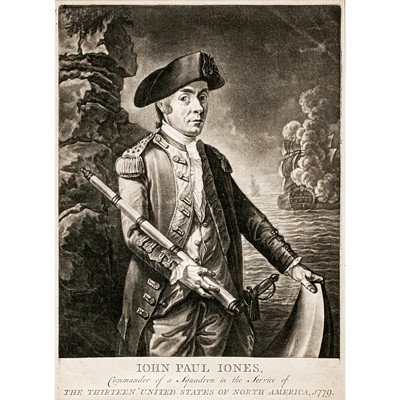1890 Dated, National Mary Washington Memorial Association Gold Medal No. 65 and Presentation Case
Lot 120
Categories
Estimate:
$500 - $700
Absentee vs Live bid
Two ways to bid:
- Leave a max absentee bid and the platform will bid on your behalf up to your maximum bid during the live auction.
- Bid live during the auction and your bids will be submitted real-time to the auctioneer.
Bid Increments
| Price | Bid Increment |
|---|---|
| $0 | $10 |
| $200 | $20 |
| $300 | $25 |
| $500 | $50 |
| $1,000 | $100 |
| $2,000 | $200 |
| $3,000 | $250 |
| $5,000 | $500 |
| $10,000 | $1,000 |
| $20,000 | $2,000 |
| $30,000 | $2,500 |
| $50,000 | $5,000 |
| $100,000 | $10,000 |
| $200,000 | $20,000 |
| $300,000 | $25,000 |
| $500,000 | $50,000 |
About Auction
By Early American History Auctions
Jan 23, 2021
Set Reminder
2021-01-23 12:00:00
2021-01-23 12:00:00
America/New_York
Bidsquare
Bidsquare : Early American History Auction of Autographs, Americana, Political & Maps
https://www.bidsquare.com/auctions/early-american-history-auctions/early-american-history-auction-of-autographs-americana-political-maps-6311
311 Lots of Rare, Historic Autographs, Americana, Civil War Era, George Washington, Abraham Lincoln, Slavery & Black History, Revolutionary War Era, Colonial America, Federal Period, War of 1812, Colonial Currency, Indian Peace Medals & more... Early American History Auctions auctions@earlyamerican.com
311 Lots of Rare, Historic Autographs, Americana, Civil War Era, George Washington, Abraham Lincoln, Slavery & Black History, Revolutionary War Era, Colonial America, Federal Period, War of 1812, Colonial Currency, Indian Peace Medals & more... Early American History Auctions auctions@earlyamerican.com
- Lot Description
Washington Related
Rare 1890 National Mary Washington 14K Gold Badge Memorial Association #65 with Original Presentation Case
1890-Dated, National Mary (Mother of George Washington; Born c. 1709-1789) Washington Memorial Association Gold Badge/Medal #65 with Blue Silk Ribbon and original Hanger Pin with its Presentation Case, Choice Extrremely Fine.
This rare original 14K rose Gold Badge/Medal is 40 mm and weighs 10.7 grams and it is accompanied by the original J. E. Caldwell & Co. presentation box of the National Mary Washington Memorial Association. Its design is in the shape of a White Enamel Five-Pointed Star, Balls at the tips, with the old English letters; N, M, W, M, & A, in Blue Enamel on their points. The center features the Head of Mary Washington surrounded by laurel leaves. The center of the reverse displays the Washington Family Shield in White and Red Enamel. The reverse points are beautifully Engraved with, "No. 65, Elizabeth Brown, Feb. 22nd. 1890." The top point is marked, "Caldwell & Co. - Phila. - Pat." This Badge The red leather covered original silk lined box exhibits wear and age, yet the medal itself is in excellent condition with intact enamel and a bright, fresh appearance. The first we have offered.
The National Mary Washington Memorial Association was founded in 1890 to finance the construction of the memorial for the revered Mother of George Washington after her original headstone was severely damaged during the Civil War and chipped by souvenir hunters. This was the only Memorial in America fully financed by Women for a Woman. Rarely seen.
Mary Washington (Mother of George Washington) (Ball; born sometime between 1707 and 1709 - August 25, 1789), was the second wife of Augustine Washington, a planter in Virginia, and the mother of George Washington, the first President of the United States, and five other children. Washington lived a large part of her life in Fredericksburg, Virginia, where many monuments were erected in her honor and a university plus other public buildings bear her name.
Mary Ball was born sometime between 1707 and 1709 at either Epping Forest, her family's plantation in Lancaster County, Virginia or at a plantation near the village of Simonson, Virginia. She was the only child of Col. Joseph Ball (1649-1711) and his second wife, Mary Johnson Ball. Joseph was born in England and emigrated to Virginia as a child. Fatherless at three and orphaned at twelve, Mary Ball was placed under the guardianship of George Eskridge, a lawyer, in accordance with the terms of her mother's will, for whom her son George Washington, was named, consistent with the naming conventions at the time.
Her paternal grandfather was William Ball (1615-c.1680); he left England for Virginia in the 1650s. His wife Hannah Atherold arrived later along with their four children, including Mary's father Joseph.
Augustine Washington had sailed to Britain on business (and to visit his sons who had been sent to school there) but on his return, he discovered that his first wife, Jane Butler Washington, had died in the interim.
George Eskridge supposedly arranged an introduction between his friend, Washington, and his ward Mary Ball, with the two marrying on March 6, 1731 when she was 22. She was wealthy by the standards of the day and brought at least 1000 acres of inherited property to the marriage. The couple had the following children:
George Washington (1732-1799), the first President of the United States, who married Martha Dandridge
Elizabeth "Betty" Washington (1733-1797), who married Fielding Lewis
Samuel Washington (1734-1781), who married five times
John Augustine Washington (1736-1787), who married Hannah Bushrod
Charles Washington (1738-1799), who married Mildred Thornton
Mildred Washington (1739-1740), who died young.
Augustine died in 1743 when son George was 11 years old. On his deathbed, "Gus" gave his son George three books on prayer. In some of those books, now in the Lyceum in Boston, Mary Ball Washington, also wrote her name. Unlike most widows in Virginia at the time, Mary Ball Washington never remarried. When George was 14, his older half-brother Lawrence Washington, who commanded a unit of Virginia Militia that served on board with British Admiral Edward Vernon, for whom Mount Vernon was named, arranged for young George to become a British Navy Midshipman.
However, Mary's highly respected half-brother, Joseph Ball, under whom the Virginia House of Burgesses had voted money to pay the cost for Virginia's young men to go study for the ministry, wrote a reply to her letter requesting advice, wherein he said do not allow your son George to join the British Navy, for they will "...treat him worse than a slave or a dog."
Mary managed the family estate and 276 acres of Ferry Farm (a plantation) with the help of others until her eldest son came of age and well beyond. She lived to see that her son, George Washington, commanded the Continental Army to independence and be inaugurated as the first President of the United States in 1789. After learning that he had been elected president in April 1789, George Washington traveled from Mount Vernon to visit his mother in Fredericksburg.
He was accompanied by Martha Washington's grandson George Washington Parke Custis. George Washington knew his Mother was ill. She was suffering from breast cancer, the disease to which she eventually succumbed, but, he sought her blessing as he embarked on another service to his Country: the new concept of "The Presidency of the United States."
Here, as popularly told, the stories and lore-probably begun and perpetuated by Custis-take over. It is said that Mrs. Washington informed her son of her poor health and expected to die soon. Further, the story continues, that her son, George, said that he would need to decline to serve as president. George's mother Mary responded, saying, "But go, George, fulfill the high destinies which Heaven appears to have intended for you for; go, my son, and may that Heaven's and a mother's blessing be with you always." This purely legendary account is frequently cited as true, but cannot be verified.
What can be documented is that he received her approval and, of course, left Fredericksburg and made his way to New York City where he was inaugurated at the end of April.
After a lengthy illness, on August 25, 1789, Mary Ball Washington died of breast cancer at her home in Fredericksburg, Virginia.
- Shipping Info
-
Early American provides in-house worldwide shipping. Please contact us directly if you have questions about your specific shipping requirements.
-
- Buyer's Premium



 EUR
EUR CAD
CAD AUD
AUD GBP
GBP MXN
MXN HKD
HKD CNY
CNY MYR
MYR SEK
SEK SGD
SGD CHF
CHF THB
THB












